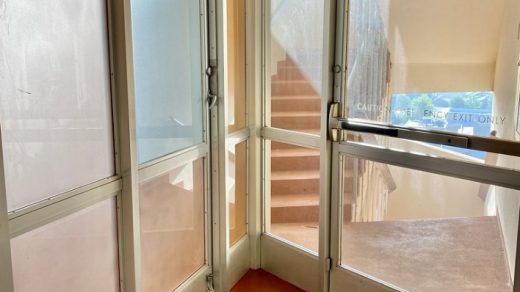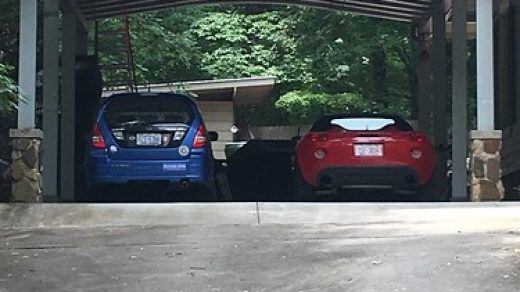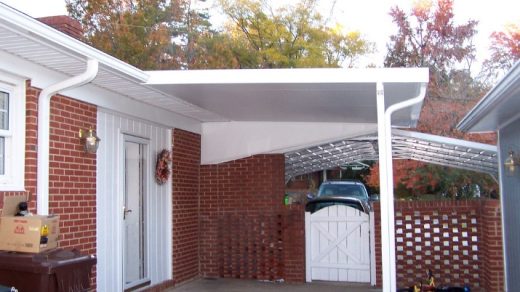Modern Carport Designs
Modern carport designs blend functionality with sleek aesthetics, offering an attractive solution for protecting vehicles while enhancing the overall look of a property. Featuring innovative materials, minimalist structures, and versatile layouts, these designs cater to contemporary tastes and environmental considerations. Whether integrated into a residential or commercial setting, modern carports provide a stylish and practical upgrade that complements various architectural styles.
Minimalist Structures
Modern carport designs are characterized by sleek lines, clean aesthetics, and functional simplicity. Minimalist structures emphasize the use of new materials and innovative construction techniques to create unobtrusive yet stylish shelter solutions for vehicles. These designs often incorporate open frameworks, flat roofs, and seamless integration with the surrounding architecture, making them ideal for contemporary homes. The focus on minimalism ensures that the carport enhances the overall visual appeal without overwhelming the property’s landscape. Additionally, modern materials such as glass, steel, and concrete are commonly used to achieve durable and low-maintenance structures that blend seamlessly with modern urban or suburban environments.
Use of Sleek Materials
Modern carport designs focus on combining functionality with aesthetic appeal, creating structures that seamlessly integrate with contemporary architectural styles. The use of sleek materials such as steel, aluminum, and tempered glass enhances the minimalist look and ensures durability. These materials allow for clean lines and smooth surfaces that complement modern homes. Additionally, incorporating innovative roofing options like polycarbonate panels or perforated metal sheets can provide added shade and ventilation while maintaining a streamlined appearance. Overall, modern carport designs emphasize simplicity, durability, and elegance through the strategic use of sleek, high-quality materials.
Integrated Lighting Features
Modern carport designs incorporate sleek lines and innovative materials to create functional and aesthetically pleasing structures. These designs often emphasize minimalism and clean geometric shapes, seamlessly blending with contemporary architectural styles. Integrated lighting features are a popular addition, providing enhanced visibility and safety during nighttime. LED strip lights, recessed lighting, and sensor-activated fixtures are commonly used to highlight the structure’s features while offering practical illumination. Combining modern materials such as metal, glass, and engineered wood with integrated lighting not only elevates the overall look but also increases the usability of the carport, making it a stylish and practical element of modern home design.
Open-Plan Aesthetics
Modern carport designs emphasize open-plan aesthetics that seamlessly blend functionality with sleek, contemporary style. These designs often feature clean lines, minimalist structures, and innovative materials that enhance the overall visual appeal of the property. Open-plan layouts allow for better integration with the landscape, creating a sense of spaciousness and harmony between the built environment and nature. Additionally, modern carports frequently incorporate transparent elements like glass panels or open frameworks to maximize light and airflow, making them a stylish yet practical addition to modern homes. The focus on simplicity and elegant design ensures that these carports not only serve their primary purpose but also contribute to the architectural sophistication of the residence.
Traditional Carport Styles
Traditional carport styles offer a timeless and functional approach to sheltering vehicles, blending seamlessly with various architectural designs. These classic structures prioritize simplicity, practicality, and durability, making them a popular choice for homeowners seeking cost-effective and low-maintenance solutions. Exploring different traditional carport designs can provide valuable ideas for enhancing your property’s curb appeal and protecting your vehicles.
Gable Roof Carports
Gable roof carports are a popular traditional style of carport design that features a pitched roof with two sloping sides that meet at a central ridge. This classic design not only provides effective water runoff but also adds an aesthetic appeal to residential properties. Gable roof carports are versatile and can be constructed from various materials, making them suitable for different architectural styles. Their simple yet elegant structure offers excellent protection for vehicles from the elements while enhancing the overall look of the home. This design is often favored for its durability, ease of maintenance, and timeless appearance in the realm of carport designs.
Hip Roof Designs
Hip roof designs are a popular choice in traditional carport styles due to their classic appearance and durable structure. These designs feature four angled sides that slope downwards toward the walls, providing effective protection from the elements. Hip roof carports are known for their stability and resistance to wind, making them ideal for various climates. They often blend seamlessly with existing home architectures, creating a cohesive and attractive look. The sloped roof also allows for better water runoff and reduces the likelihood of snow buildup in colder areas. Overall, hip roof styles offer a timeless and practical solution for protecting vehicles while enhancing the aesthetic appeal of a property.
Post-and-Beam Construction
Traditional carport styles often feature post-and-beam construction, providing a classic and sturdy structure that complements various home designs. This construction method involves vertical posts supporting horizontal beams, creating an open and airy space forvehicle coverage. The posts are typically made of wood, steel, or aluminum, offering durability and aesthetic appeal. Post-and-beam carports can be customized with different roof styles, such as gable, flat, or shed, allowing homeowners to match their overall architectural style. This design not only offers reliable protection from the elements but also adds a rustic or timeless charm to the property. Overall, post-and-beam construction remains a popular choice for those seeking a functional yet visually appealing carport solution.
Decorative Columns and Details
Traditional carport styles often feature classic elements that emphasize durability and timeless appeal. These designs typically include pitched or gabled roofs, sturdy wood or metal framing, and straightforward structures that blend seamlessly with historic or conventional home architecture. Decorative columns and intricate details further enhance these carports, adding elegance and character. Columns can be crafted from materials like wood, stone, or precast concrete, often featuring capitals or bases for a more refined look. Ornamental details such as scrollwork, lattice panels, and trim accents contribute to a charming aesthetic, making traditional carports not only functional shelter but also a visually appealing extension of the home’s overall design.
Materials and Construction Options
When exploring carport designs, choosing the right materials and construction options is essential for creating a durable, functional, and visually appealing structure. The variety of materials available allows for customization to suit different styles, budgets, and environmental conditions. Understanding the options can help you select the most suitable construction methods to ensure your carport stands the test of time.
Wooden Carports
Wooden carports offer a versatile and attractive solution for protecting your vehicle while enhancing the overall aesthetic of your property. When considering materials, high-quality lumber such as cedar, redwood, or pressure-treated pine is often preferred due to their durability and resistance to weathering. For construction, options range from traditional post-and-beam structures to modern freestanding designs, allowing for customization based on style and space requirements. Reinforcing joints with metal brackets and utilizing weather-resistant sealants can extend the lifespan of wood carports. Additionally, the choice of roofing materials, such as asphalt shingles, metal sheets, or polycarbonate panels, can influence both the durability and visual appeal of the structure. Overall, wooden carports are customizable, eco-friendly, and provide a natural look that complements various architectural styles.
Metal Carports
Metal carports offer versatile and durable options for protecting your vehicles while enhancing the overall look of your property. When choosing materials and construction options for carport designs, it is important to consider longevity, maintenance, and aesthetic appeal.
- Galvanized Steel: Widely used for its rust resistance and strength, galvanized steel provides a long-lasting solution that withstands harsh weather conditions.
- Aluminum: Lighter than traditional steel, aluminum is also resistant to corrosion and easy to maintain, making it ideal for various design styles.
- Steel with Powder Coating: Applying a powder coating adds an extra layer of protection against corrosion and provides a sleek finish in different colors.
- Frame Construction: Options include bolted or welded frames, with welded frames offering greater stability and strength for larger or more elaborate designs.
- Roof Styles: Gabled, single-slope, or curved roofs are common choices, each offering different aesthetic appeal and functional advantages such as water runoff and wind resistance.
Material selection and construction methods play a crucial role in determining the durability, appearance, and cost of your metal carport, allowing you to customize your design to meet your needs and preferences.
Polycarbonate and PVC Options
When selecting materials and construction options for carport designs, polycarbonate and PVC are popular choices due to their durability and versatility. Polycarbonate panels provide excellent impact resistance and UV protection, making them ideal for weather-resistant roofing solutions. They are lightweight yet strong, allowing for easy installation and a sleek appearance. PVC, on the other hand, is a cost-effective material that offers good chemical resistance and low maintenance. PVC panels are often used for sidewalls or structural components, providing a sturdy and weatherproof barrier. Both materials can be adapted to various design styles, providing flexibility in creating functional and visually appealing carports.
Combination Materials
When exploring carport designs, the selection of materials and construction options plays a vital role in achieving durability, aesthetics, and functionality. Combining different materials allows for innovative designs that can complement various architectural styles while enhancing strength and weather resistance. Common materials used include steel, wood, aluminum, and polycarbonate, each offering unique advantages.
Combination materials in carport construction often involve pairing steel or aluminum frames with wooden accents or roofing elements. Steel provides excellent structural support and longevity, while wood adds warmth and visual appeal. Polycarbonate panels are frequently used for roofing due to their lightweight nature and UV resistance, offering protection from the elements without significant added weight.
Choosing the right combination depends on factors such as budget, climate, and desired aesthetic. For example, a steel frame with wooden pergola accents can create a modern yet inviting look, while a fully galvanized steel structure ensures low maintenance and maximum durability against harsh weather conditions. Integrating different materials can also optimize cost efficiency and ease of construction, providing a tailored solution that meets both practical and stylistic needs.
Custom and Creative Carport Designs
Custom and creative carport designs offer a unique blend of functionality and aesthetic appeal, transforming a simple shelter into an attractive extension of your home. With a wide range of styles, materials, and personalized features, these designs provide homeowners with tailored solutions that meet their specific needs and enhance curb appeal. Whether modern, rustic, or minimalist, custom carports can seamlessly complement any property while providing essential protection for vehicles.
Colorful and Artistic Finishes
Custom and creative carport designs offer a unique way to enhance the beauty and functionality of your property. By incorporating innovative shapes, materials, and layouts, you can create a carport that perfectly suits your aesthetic and practical needs. These personalized designs not only provide shelter for your vehicle but also serve as a stylish feature in your outdoor space.
Colorful and artistic finishes further elevate the appeal of your carport, transforming it from a simple shelter into a vibrant statement piece. Bright hues, artistic murals, or innovative paint techniques can add personality and charm, reflecting your individual taste. These artistic touches can complement your home’s exterior, making your carport a standout element in your overall landscape design.
Multi-Functional Carports
Custom and creative carport designs offer a unique way to enhance the appearance and functionality of your property. By integrating innovative styles and personalized features, you can make your carport a standout feature that complements your home’s architecture. From modern, sleek designs to rustic, charming structures, customization allows for a perfect match to your aesthetic preferences.
Multi-functional carports are designed to serve multiple purposes beyond just protecting your vehicle. They can be utilized as outdoor living spaces, storage solutions, or even gardening areas. Incorporating additional features such as built-in seating, lighting, or storage compartments can maximize the utility of your carport while maintaining a stylish and functional space. These versatile structures provide an excellent blend of practicality and design, catering to your specific needs and enhancing your property’s overall value.
Eco-Friendly and Sustainable Designs
Custom and creative carport designs offer a unique way to enhance the aesthetic appeal and functionality of your property. By incorporating innovative structures, materials, and styles, you can create a carport that complements your home’s architecture while providing practical shelter for your vehicles. Personalized designs can range from modern, sleek structures to rustic, charming looks that express your individual taste.
Eco-friendly and sustainable carport designs focus on minimizing environmental impact through the use of renewable materials, energy-efficient features, and eco-conscious construction practices. Incorporating elements such as solar panels, recycled wood, and permeable paving can make your carport not only stylish but also environmentally responsible. These sustainable designs help reduce carbon footprints, promote energy conservation, and contribute to a greener future.
Attachment vs. Freestanding Structures
Custom and creative carport designs offer a versatile way to enhance the appearance and functionality of your property. They can be tailored to match the architectural style of your home while providing adequate protection for vehicles. Whether aiming for a modern, rustic, or traditional look, personalized carport designs can reflect your individual taste and needs.
Attachment carports are connected directly to the main structure of the house, providing seamless integration and potentially reducing construction costs. They often offer better protection from the elements as they are enclosed on multiple sides, and can serve as an extension of your home. However, they might limit access or future flexibility if you wish to modify the structure later.
Freestanding carports, on the other hand, are independent structures that can be placed anywhere on your property. They offer greater flexibility in design and location, making them ideal for properties with unique layouts. These structures are easier to dismantle or relocate if needed, but may require additional support and maintenance. Both attachment and freestanding carports can be customized creatively to complement your home and landscape, ensuring both aesthetics and practicality are achieved.
Innovative Features and Trends
Innovation in carport designs is continuously driven by emerging trends and advanced features that enhance functionality, aesthetics, and sustainability. Modern carports go beyond traditional structures, incorporating innovative materials, smart technology integration, and flexible designs to meet diverse needs. Staying abreast of these features allows homeowners and designers to create more efficient and attractive outdoor spaces that complement their lifestyles and architectural styles.
Smart Technology Integration
Innovative features and trends in carport designs are increasingly focused on smart technology integration to enhance functionality, security, and convenience. Modern carports now incorporate automated systems that allow for remote opening and closing, smart lighting that adjusts based on occupancy or time of day, and sensors that detect weather conditions to protect vehicles. trends also include the use of predictive maintenance technology, which monitors structural components for potential issues before they become problematic. Additionally, eco-friendly materials combined with solar panel integration are gaining popularity, enabling carports to generate renewable energy while providing shelter. Overall, the blending of smart technology with creative design elements results in carports that are not only aesthetically appealing but also highly efficient and user-friendly.
Solar Panel Roofs
Innovative features and trends in solar panel roofs are transforming the landscape of carport designs, making them more functional and environmentally friendly. Modern solar panel roofs often incorporate sleek, integrated designs that seamlessly blend with the overall aesthetic of the structure, providing both shade and energy generation.
One notable trend is the use of bifacial solar panels, which capture sunlight from both sides, increasing energy efficiency without enlarging the roof area. Additionally, solar panel roofs are increasingly featuring monitoring systems that allow users to track energy production in real-time, optimizing performance and maintenance.
Flexible and lightweight solar materials are also gaining popularity, enabling curved or uniquely shaped carport roofs that complement contemporary architectural styles. Some designs even incorporate movable or adjustable solar panels, allowing users to modify angles for maximum sunlight exposure or shading.
Furthermore, integrating solar panel roofs with energy storage solutions and smart home systems is becoming a common trend, promoting sustainable living and energy independence. These innovations are not only enhancing the practicality of carport designs but also elevating their role in eco-conscious construction and urban planning.
Automated Entry Systems
Innovative features and trends in carport designs are increasingly focusing on automation to enhance convenience, security, and user experience. Automated entry systems, such as keyless entry, RFID readers, and smartphone-controlled gates, are becoming popular, allowing seamless access without manual intervention. These systems help protect vehicles from theft and unauthorized access while providing a modern and streamlined aesthetic. Additionally, integration with smart home technology allows carports to communicate with other devices, enabling features like automatic opening based on proximity or programmed schedules. The adoption of automated entry systems not only improves functionality but also elevates the overall design by offering sleek, minimalistic solutions that complement contemporary architecture. As technology advances, expect to see more innovative, user-friendly, and secure automated features embedded in custom carport designs to meet the evolving needs of homeowners and property managers.
Drainage and Water Management
Innovative features and trends in drainage and water management are transforming carport designs by emphasizing sustainability and efficiency. Modern carports often incorporate integrated drainage systems that prevent water accumulation and reduce erosion, enhancing durability. Permeable materials and water-absorbing surfaces are increasingly popular, allowing rainwater to seep into the ground naturally. Additionally, the use of smart drainage solutions, such as sensors and automated channels, helps manage varying water flow and prevents flooding. These advancements not only improve the functionality of carports but also support eco-friendly practices, making them an essential aspect of contemporary architectural design.


